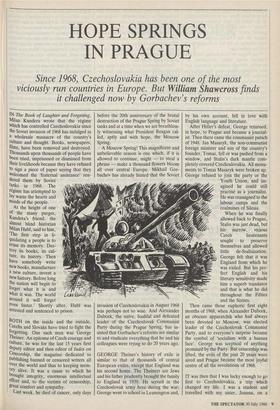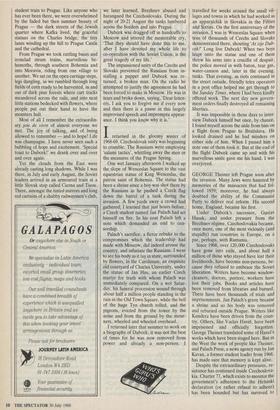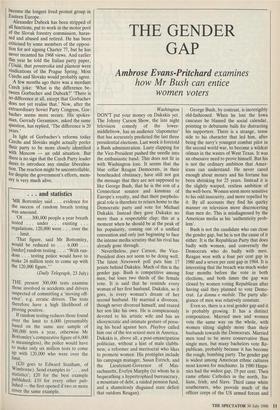HOPE SPRINGS IN PRAGUE
Since 1968, Czechoslovakia has been one of the most
viciously run countries in Europe. But William Shawcross finds
it challenged now by Gorbachev's reforms
IN The Book of Laughter and Forgetting, Milan Kundera wrote that the regime which has controlled Czechoslovakia since the Soviet invasion of 1968 has indulged in a wholesale massacre of the country's culture and thought. Books, newspapers, films, have been removed and destroyed. Thousands upon thousands of people have been tried, imprisoned or dismissed from their livelihoods because they have refused to sign a piece of paper saying that they welcomed the 'fraternal assistance' ren- dered them by Soviet tanks in 1968. The regime has attempted to lay waste the hearts and minds of the people.
At the height of one of the many purges, Kundera's friend, the almost blind historian Milan Hubl, said to him, 'The first step in li- quidating a people is to erase its memory. Des- troy its books, its cul- ture, its history. Then have somebody write new books, manufacture a new culture, invent a new history. Before long the nation will begin to forget what it is and what it was. The world around it will forget even faster.' Shortly after, Hubl was arrested and sentenced to prison.
BOTH on the inside and the outside, Czechs and Slovaks have tried to fight the forgetting. One such man was George Theiner. An epitome of Czech courage and culture, he was for the last 15 years first deputy editor and then editor of Index on Censorship, the magazine dedicated to publishing banned or censored writers all over the world and thus to keeping mem- ory alive. It was a cause to which he brought integrity, enormous intellectual effort and, to the victims of censorship, great comfort and sympathy. Last week, he died of cancer, only days before the 20th anniversary of the brutal destruction of the Prague Spring by Soviet tanks and at a time when we are breathless- ly witnessing what President Reagan cal- led, aptly and with hope, the Moscow Spring.
A Moscow Spring! This magnificent and unbelievable season is one which, if it is allowed to continue, might — to steal a phrase — make a thousand flowers bloom all over central Europe. Mikhail Gor- bachev has already hinted that the Soviet
invasion of Czechoslovakia in August 1968 was perhaps not so wise. And Alexander Dubcek, the naïve, bashful and defeated leader of the Czechoslovak Communist Party during the Prague Spring, has in- sisted that Gorbachev's reforms are similar to and vindicate everything that he and his colleagues were trying to do 20 years ago.
GEORGE Theiner's history of exile is similar to that of thousands of central European exiles, except that England was his second home. The Theiners are Jews and his father prudently brought the family to England in 1939. He served in the Czechoslovak army here during the war; George went to school in Leamington and, by his own account, fell in love with English language and literature.
After Hitler's defeat, George returned, in hope, to Prague and became a journal- ist. Then there came the communist putsch of 1948. Jan Masaryk, the non-communist foreign minister and son of the country's founder, Tomas, fell or was pushed from a window, and Stalin's dark mantle com- pletely covered Czechoslovakia. All monu- ments to Tomas Masaryk were broken up. George refused to join the party or the Youth Union, and im- agined he could still practise as a journalist. He was reassigned to the labour camps and the coalmines of Silesia.
When he was finally allowed back to Prague, Stalin was just dead, but his narrow, vicious Czech lieutenants sought to preserve themselves and allowed little de-Stalinisation. George felt that it was England from which he was exiled. But his per- fect English and his literary sensitivity made him a superb translator and that is what he did throughout the Fifties and the Sixties.
Then came those euphoric first eight months of 1968, when Alexander Dubcek, an obscure apparatchik who had always been devoted to Moscow, was elected leader of the Czechoslovak Communist Party, and to everyone's surprise became the symbol of 'socialism with a human face'. George was sceptical of anything promised by the Party. But censorship was lifted, the evils of the past 20 years were aired and Prague became the most joyful centre of all the revolutions of 1968.
IT was then that I was lucky enough to go first to Czechoslovakia, a trip which changed my life. I was a student and travelled with my sister, Joanna, on a student train to Prague. Like anyone who has ever been there, we were overwhelmed by the faded but then summer beauty of Prague — the dark streets of the Jewish quarter where Kafka lived, the graceful statues on the Charles bridge, the tiny lanes winding up the hill to Prague Castle and the cathedral.
From Prague we took rattling buses and ironclad steam trains, marvellous be- hemoths, through southern Bohemia and into Moravia, riding from one village to another. We sat on the open carriage steps, legs dangling, as we rumbled through long fields of corn ready to be harvested, in and out of dark pine forests where cart tracks meandered across the rails, and into neat little stations bedecked with flowers, where people put out their hand to have the monsters halt.
Most of all I remember the extraordin- ary joie de vivre of almost everyone we met. The joy of talking, and of being allowed to remember — and to hope! Life was champagne. I have never seen such a bubbling of hope and excitement. 'Special toast to Dubcek!' we drank over and over and over again.
Yet the clouds from the East were already casting long shadows. While I was there, in July and early August, the Soviet leaders arrived in an armoured train at a little Slovak stop called Cierna and Tisou. There, amongst the tinted mirrors and long red curtains of a shabby railwaymen's club, we later learned, Brezhnev abused and harangued the Czechoslovaks. During the night of 20-21 August the tanks lumbered across the borders and into Prague.
Dubcek was dragged off in handcuffs to Moscow and uttered the memorable cry, `That they should have done this to me, after I have devoted my whole life to co-operation with the Soviet Union, is the great tragedy of my life.'
The impassioned unity of the Czechs and Slovaks prevented the Russians from in- stalling a puppet and Dubcek was re- turned, a broken man. On the radio he attempted to justify the agreement he had been forced to make in Moscow. He was in tears and broke down, saying, 'Dear listen- ers, I ask you to forgive me if every now and then there is a pause in this largely improvised speech and impromptu appear- ance. I think you know why it is.'
Ireturned in the gloomy winter of 1968-69. Czechoslovak unity was beginning to crumble. The Russians were employing `salami tactics', whittling away the men or the measures of the Prague Spring.
One wet January afternoon I walked up the slope of Wenceslas Square to the vast equestrian statue of King Wenceslas, the patron saint of Bohemia. The statue had been a shrine since a boy was shot there by the Russians as he pushed a Czech flag down the barrel of a tank during the invasion. A few yards away a crowd had gathered; I learned that just hours before, a Czech student named Jan Palach had set himself on fire. In his coat Palach left a note which demanded an end to cen- sorship.
Palach's sacrifice, a fierce rebuke to the compromises which the leadership had made with Moscow, did indeed arouse the country, and infuriate the Russians. I went to see his body as it lay in state, surrounded by flowers, in the Carolinum, an exquisite old courtyard of Charles University, under the statue of Jan Hus, an earlier Czech martyr for truth with whom Palach was immediately compared. On a wet Satur- day, his funeral procession wound through about half a million people standing in the rain in the Old Town Square, while the bell of the huge Tyn church tolled, and the pigeons, evicted from the tower by the noise and from the ground by the mour- ners, wheeled and wheeled overhead.
I returned later that summer to work on a biography of Dubcek; it was not the best of times for he was now removed from power and already a non-person. I travelled for weeks around the small vil- lages and towns in which he had worked as an apparatchik in Slovakia in the Fifties and Sixties. On the first anniversary of the invasion, I was in Wenceslas Square when tens of thousands of Czechs and Slovaks demonstrated there, shouting 'At zije Dub- cek!' Long live Dubcek! When two boys leapt onto the statue and one of them threw his arms into a crucifix of despair, the police moved in with baton, tear gas, water-cannon and, later in the evening, tanks. That evening, as riots continued in the street outside, friendly telex operators in a post office helped me get through to the Sunday Times, where I had been kindly offered work. The next day new govern- ment orders finally destroyed all remaining liberties.
It was impossible in those days to inter- view Dubcek himself but once, by chance, I found myself across the aisle from him on a flight from Prague to Bratislava. He looked drained and he had minders on either side of him. When I passed him a note one of them took it. But at the end of the flight Dubcek came up and with his marvellous smile gave me his hand. I was overjoyed.
GEORGE Theiner left Prague soon after the invasion. Many Jews were haunted by memories of the massacres that had fol- lowed 1939; moreover, he had always doubted the ability of the Communist Party to deliver real reform. His second home, England, became his first.
Under Dubcek's successor, Gustav Husak, and under pressure from the Brezhnev regime, Czechoslovakia became, once more, one of the most viciously (and stupidly) run countries in Europe, on a par, perhaps, with Rumania.
Since 1968, over 120,000 Czechoslovaks have gone into exile, and about half a million of those who stayed have lost their livelihoods, have become non-persons, be- cause they refused to embrace the Soviet liberation. Writers have become window- cleaners, doctors, porters, workers have lost their jobs. Books and articles have been removed from libraries and burned. There have been thousands of trials and imprisonments. Jan Palach's grave became a shrine and so his body was removed and reburied outside Prague. Writers like Kundera have been driven from the coun- try. Others, like Vaclav Havel, have been imprisoned and officially forgotten. George Theiner translated some of Havel's works which have been staged here. But in the West the work of people like Theiner, and Palach Press, a news agency run by Jan Kavan, a former student leader from 1968, has made sure that memory is kept alive.
Despite the extraordinary pressures, re- sistance has continued inside Czechoslova- kia. Charter 77, which exists to monitor the government's adherence to the Helsinki declaration (or rather refusal to adhere) has been hounded but has survived to become the longest lived protest group in Eastern Europe. Alexander Dubcek has been stripped of all functions, put to work in the motor pool of the Slovak forestry commission, haras- sed and abused and retired. He has been criticised by some members of the opposi- tion for not signing Charter 77, but he has never recanted his 1968 views. And earlier this year he told the Italian party paper, ?Unita, that perestroika and glasnost were "indications of the Prague Spring. Most Czechs and Slovaks would probably agree.
A few months ago there was a mordant Czech joke: 'What is the difference be- tween Gorbachev and Dubcek?' There is no difference at all, except that Gorbachev does not yet realise that.' Now, after the extraordinary Soviet Party Congress, Gor- bachev seems more secure. His spokes- man, Gerrady Geramisov, asked the same question, has replied, 'The difference is 20 years.'
In light of Gorbachev's reforms today Czechs and Slovaks might actually prefer their party to be more closely identified with Moscow — an odd situation. But there is no sign that the Czech Party leader dares to introduce any similar liberalisa- tion. The reaction might be uncontrollable, for despite the government's efforts, mem- ory is very much alive.
















































 Previous page
Previous page